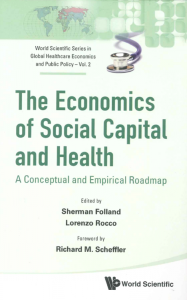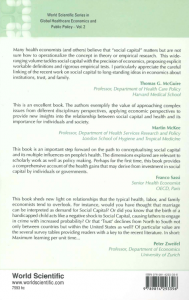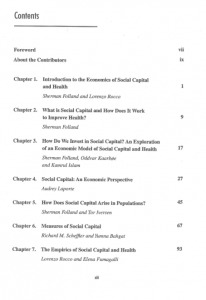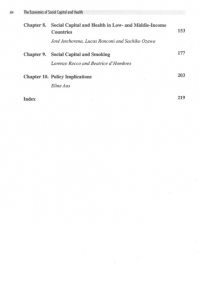The Economics of Social Capital and Health
This book defines the field of social capital and health. Over the last two decades, there has been a recognition of the importance of social capital (usually defined as ties in the community, attachment to the community, and participation in community activities) and its impact on the health of those in that community. The purpose of this book is to show the growth in the field of social capital and health and to expose readers to a variety of approaches in order to think about and model the question of how health can be improved by investments in community social capital as well as by individual social capital.
An outstanding set of papers is presented by authors from the United States, as well as from Europe and Asia. These papers are cutting-edge and explore the mechanisms through which social capital affects health. The papers also present the most recent empirical work and discuss the policy implications of their findings. Without a doubt, this is a landmark book which will make the study of social capital and its impact on health a major area of research in the coming decade.
Reviews:
“Many health economists (and others) believe that ‘social capital’ matters but are not sure how to operationalize the concept in theory or empirical research. This wide-ranging volume tackles social capital with the precision of economics, proposing explicit workable definitions and rigorous empirical tests. I particularly appreciate the careful linking of the recent work on social capital to long-standing ideas in economics about institutions, trust, and family.”
Thomas G McGuire
Professor, Department of Health Care Policy
Harvard Medical School
“This is an excellent book. The authors exemplify the value of approaching complex issues from different disciplinary perspectives, applying economic perspectives to provide new insights into the relationship between social capital and health and its importance for individuals and society.”
Martin McKee
Professor, Department of Health Services Research and Policy
London School of Hygiene and Tropical Medicine
“This book is an important step forward on the path to conceptualising social capital and its multiple influences on people’s health. The dimensions explored are relevant to scholarly work as well as policy making. Perhaps for the first time, this book provides a comprehensive account of the health gains that may derive from investment in social capital by individuals or governments.”
Franco Sassi
Senior Health Economist
OECD, Paris
“This book sheds new light on relationships that the typical health, labor, and family economists tend to overlook. For instance, would you have thought that marriage can be interpreted as demand for Social Capital? Or did you know that the birth of a handicapped child acts like a negative shock to Social Capital, causing fathers to engage in crime with increased probability? Or that ‘Trust’ declines from North to South not only between countries but within the United States as well? Of particular value are the several survey tables providing readers with a key to the recent literature. In short: Maximum learning per unit time…”
Peter Zweifel
Professor, Department of Economics
University of Zurich
Front and Back Cover:
Table of Contents:




